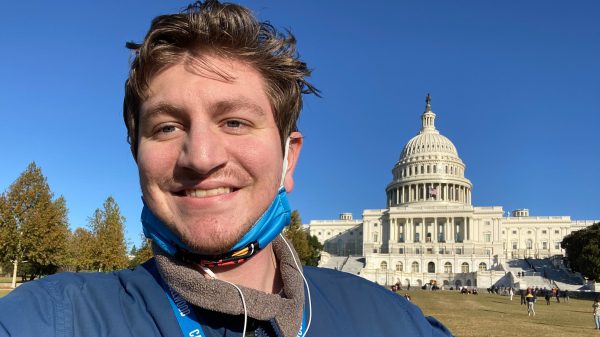
the Bazelon Center’s efforts by planning and drafting many of its social
media posts and strategies.
A Kalamazoo College student experienced an internship with an organization that protects the disabled this term.
Thomas Lichtenberg ’23—a political science and philosophy major and math minor—worked in Washington, D.C., for the Judge David A. Bazelon Center for Mental Health Law, which helps attorneys and others who work to protect the legal rights of people who experience mental disabilities. In some cases, the center will also represent individuals in court who face discrimination or a denial of needed services.
Lichtenberg earned the opportunity through the Washington Center, a group that unites college students with a variety of nonprofit organizations in the nation’s capital. As a strategic communications intern, he backed the Bazelon Center’s efforts by planning and drafting many of its social media posts and strategies. His drafts, which would get approved by a policy or legal director, touted events such as a virtual awards ceremony highlighting the center’s 49th year. That event featured figures such as singer John Legend and Speaker of the House Nancy Pelosi. He also attended a virtual briefing on infrastructure with U.S. Secretary of Transportation Pete Buttigieg, and separately met some well-known people, even if only virtually in some cases.
“I attended a congressional briefing,” he said. “I walked to the Supreme Court once and Representative Ilhan Omar was speaking about court reform there. I also met a lot of newscasters. We have a pretty strong relationship with PBS and I got to meet Judy Woodruff and a couple other PBS reporters at an afterparty for our award ceremony.”
Another event he covered through social media was a live YouTube discussion concerning the use of student resource officers in schools and how some officers have mistreated students of color and students who have disabilities. In a social campaign, however, the Bazelon Center more directly targeted publicity regarding an active case, CVS Pharmacy Inc. v. Doe, in cooperation with other disability and civil-rights groups.
“At the end of my time, we actually won that Supreme Court case and social media was essential to it,” Lichtenberg said. “It involved CVS and a group of people with HIV who argued that they were receiving different treatment based on their condition. CVS was trying to say that if it’s unintentional discrimination, then Section 504 of the Rehabilitation Act of 1973 doesn’t apply.”
Section 504 of the Rehabilitation Act of 1973 is a civil-rights law that prohibits discrimination on the basis of disability.
“A ruling like that would’ve been catastrophic for disability rights,” Lichtenberg said. “Essentially, if that were in place, the person who didn’t have full use of their legs, for example, wouldn’t have a legal recourse if someone built a building that could only be accessed by stairs. “Our social media campaign pressured CVS into withdrawing the case and commit to find a solution which respects the rights of people with disabilities, which is pretty unheard of for such a big company.”
Lichtenberg is returning to K’s campus for winter, where he served last spring as a teacher’s assistant for a logic and reasoning philosophy class that includes an independent study requirement. For that, he wanted to figure out how someone might codify a version of Star Trek’s Prime Directive, a guiding principle that prohibits Starfleet members from interfering with the natural development of alien civilizations while protecting unprepared civilizations from receiving advanced technology, knowledge and values before they’re ready for it. For now, however, he will reflect on an overwhelmingly positive experience in Washington, D.C.
“I find it amazing that there are only about seven people who work for the Bazelon Center,” Lichtenberg said. “It’s incredible that they’re able to manage the cases they do. It was a real honor to work for them and I’m excited to apply what I’ve learned to my classes in a new context.”
